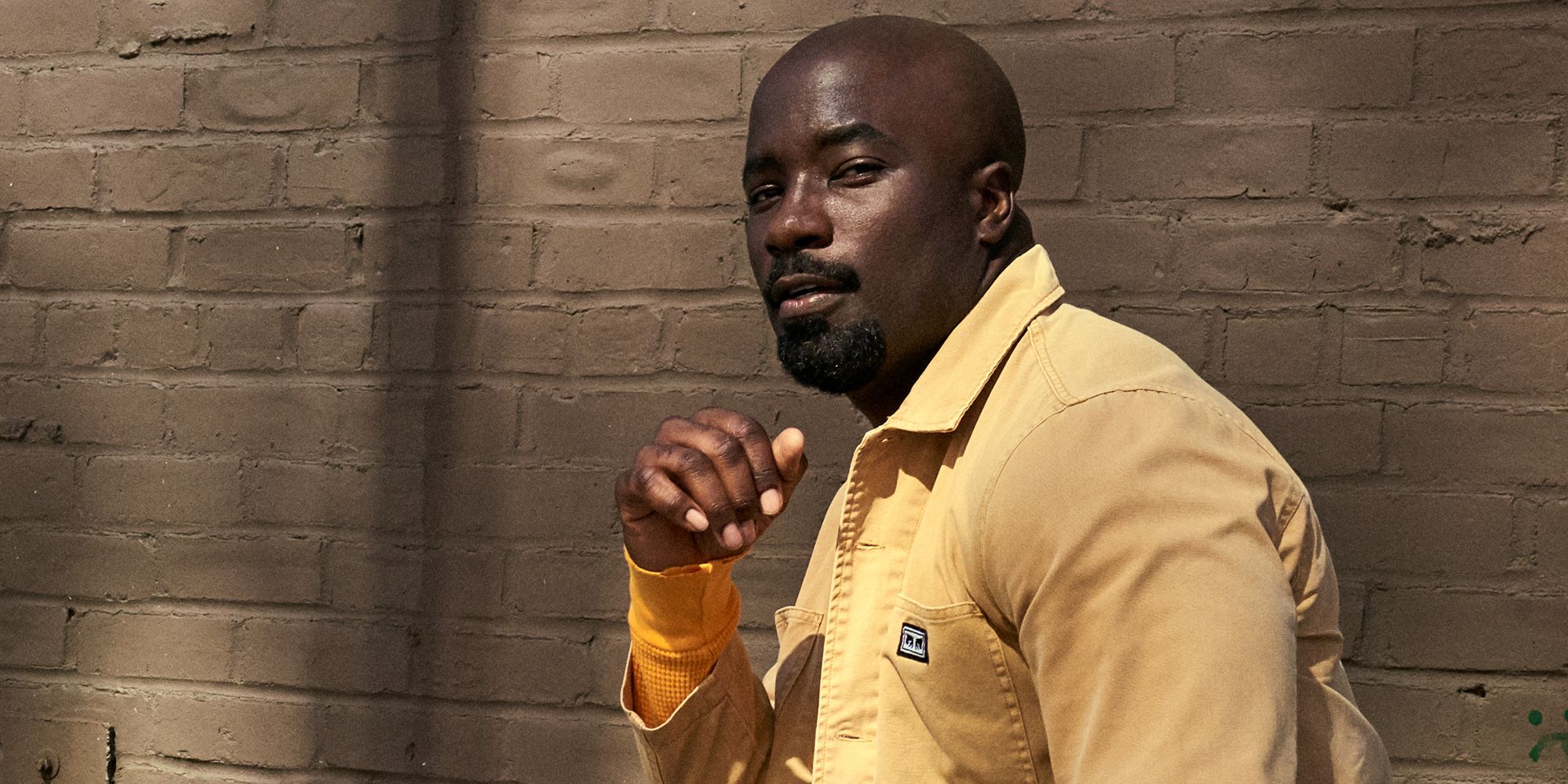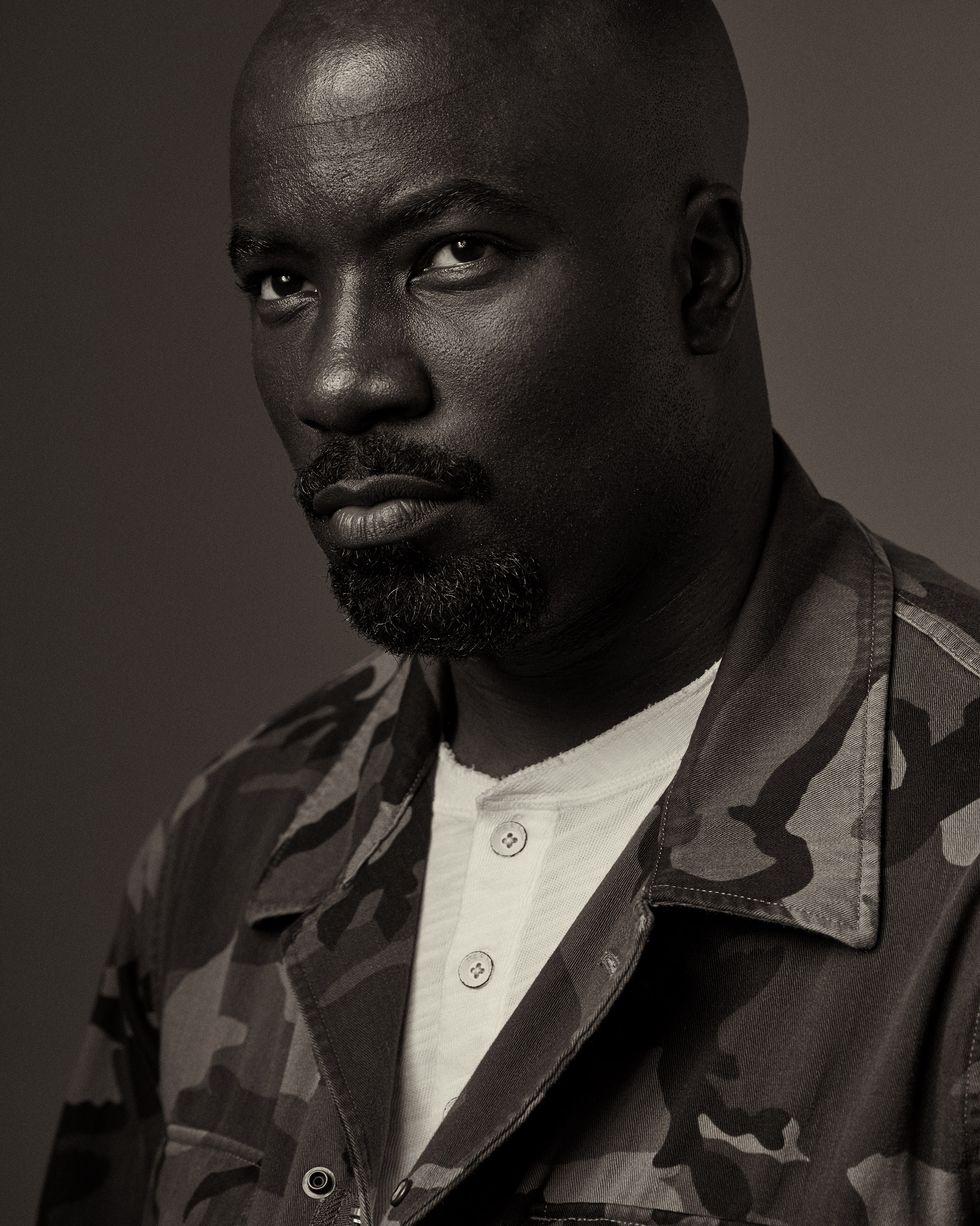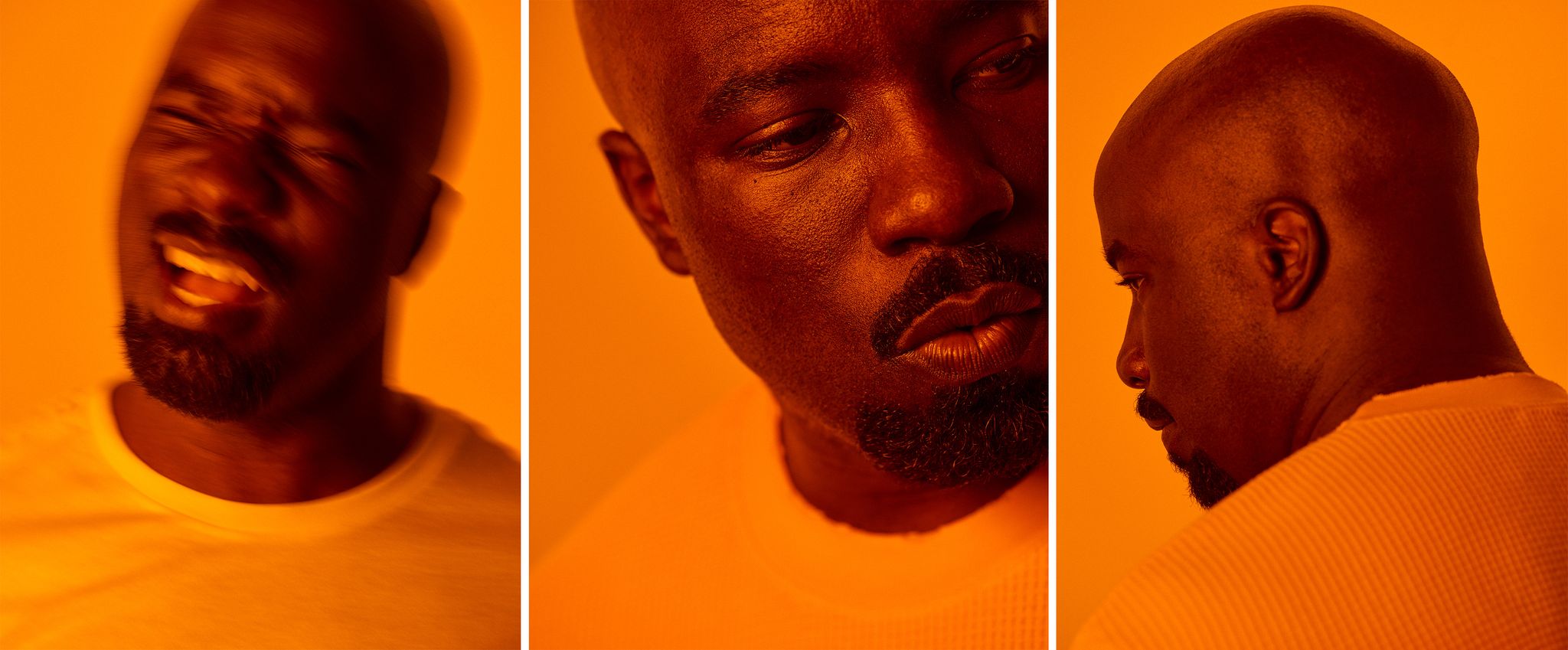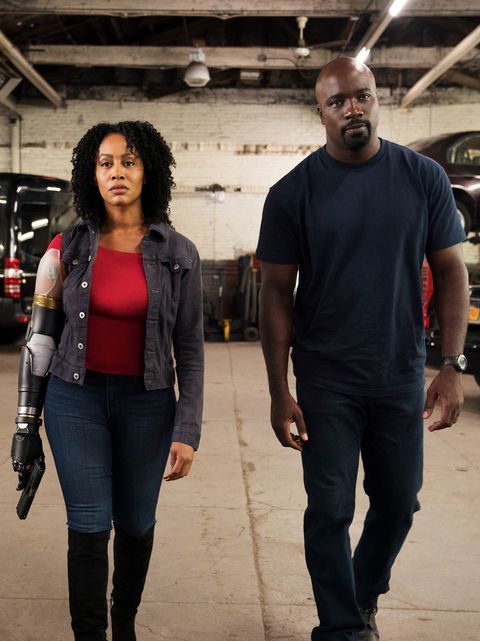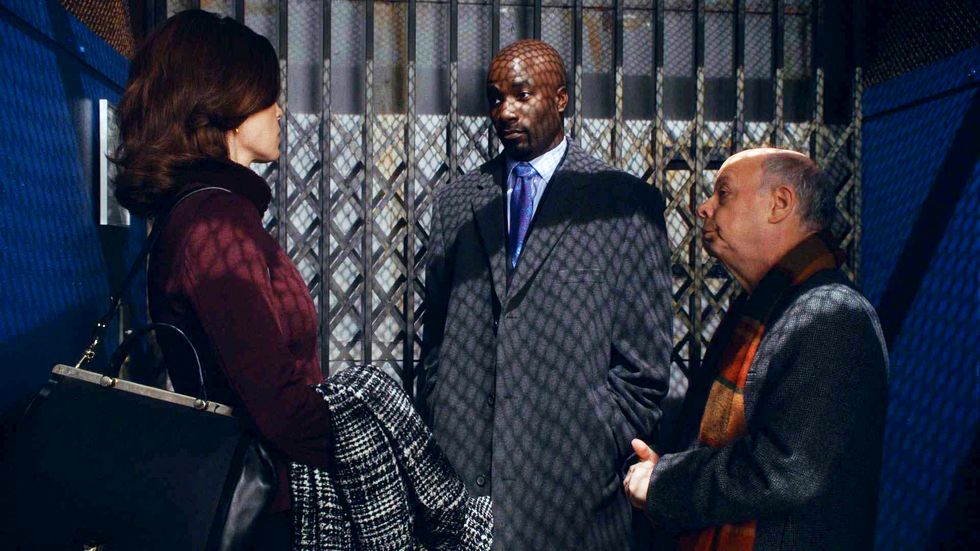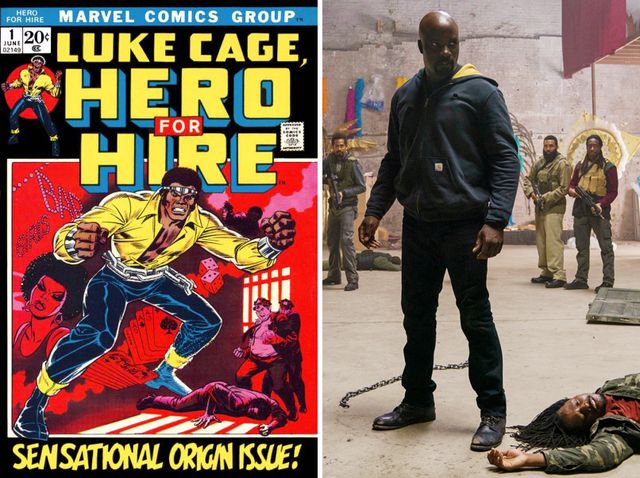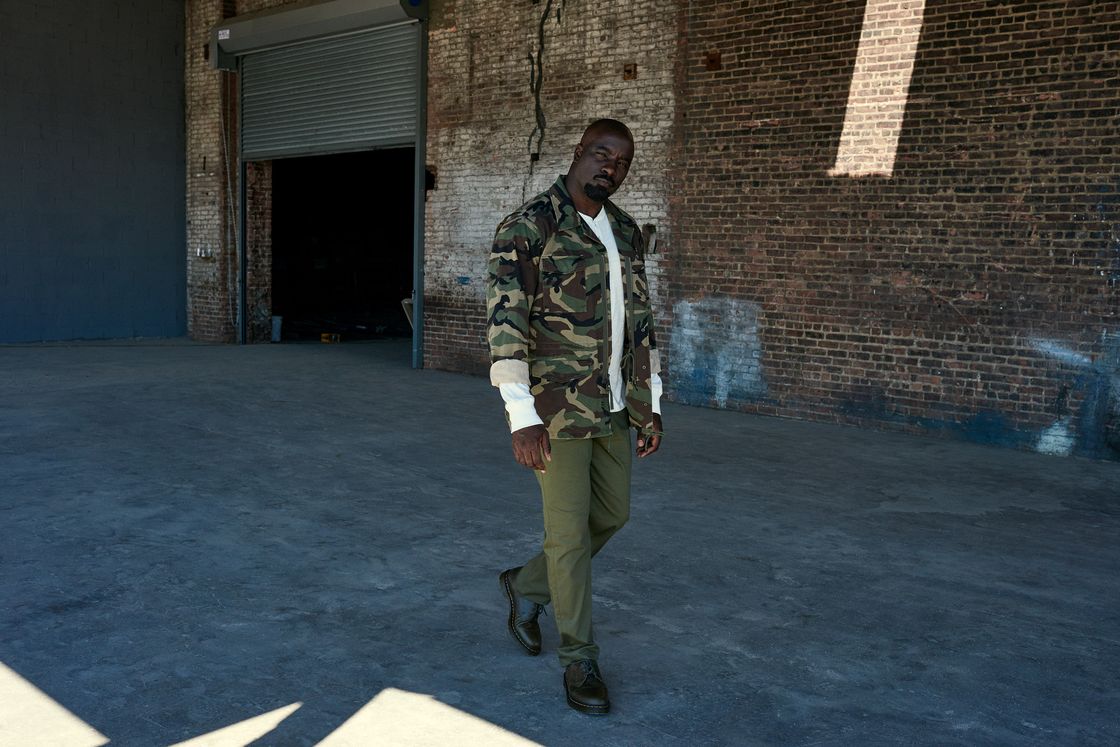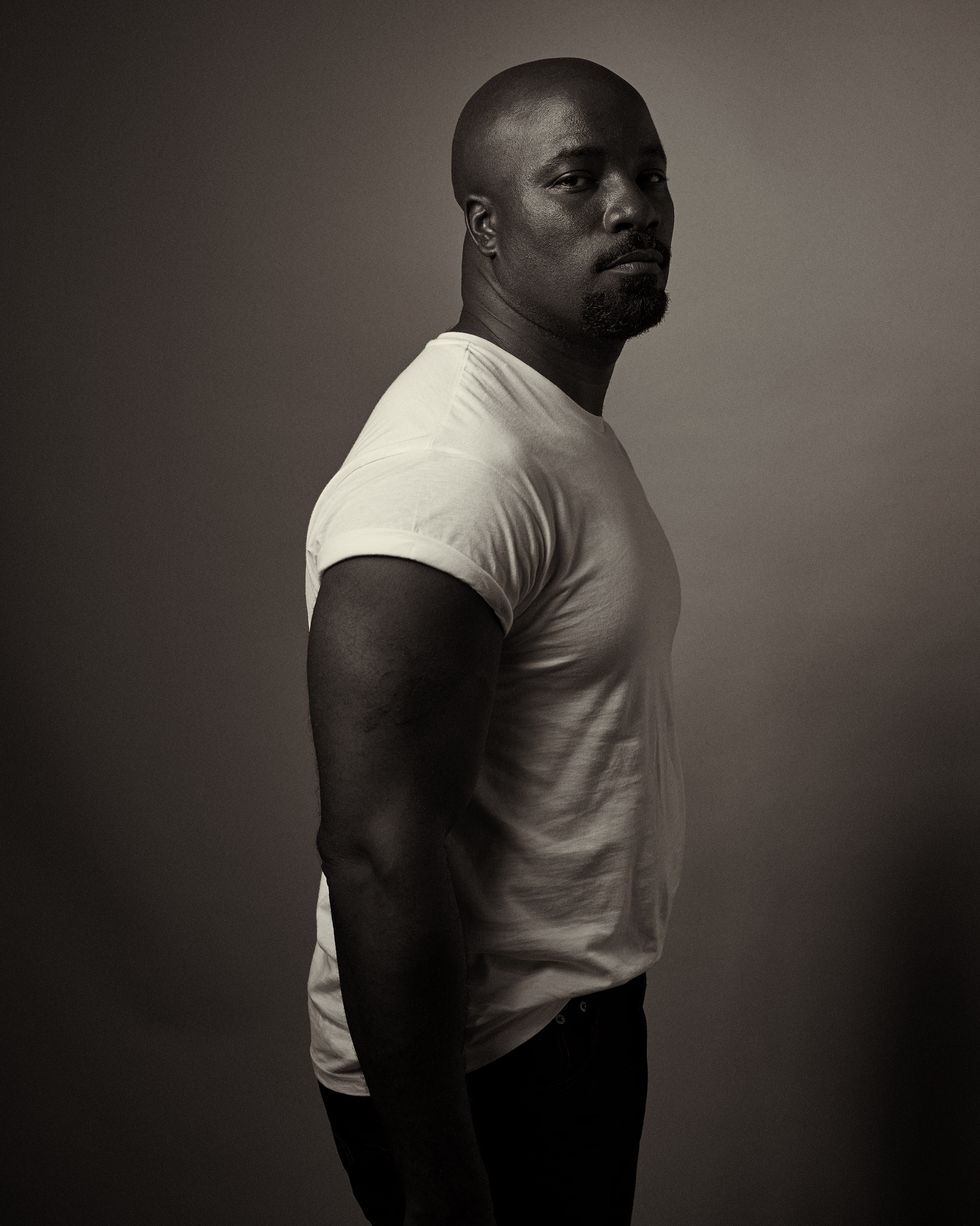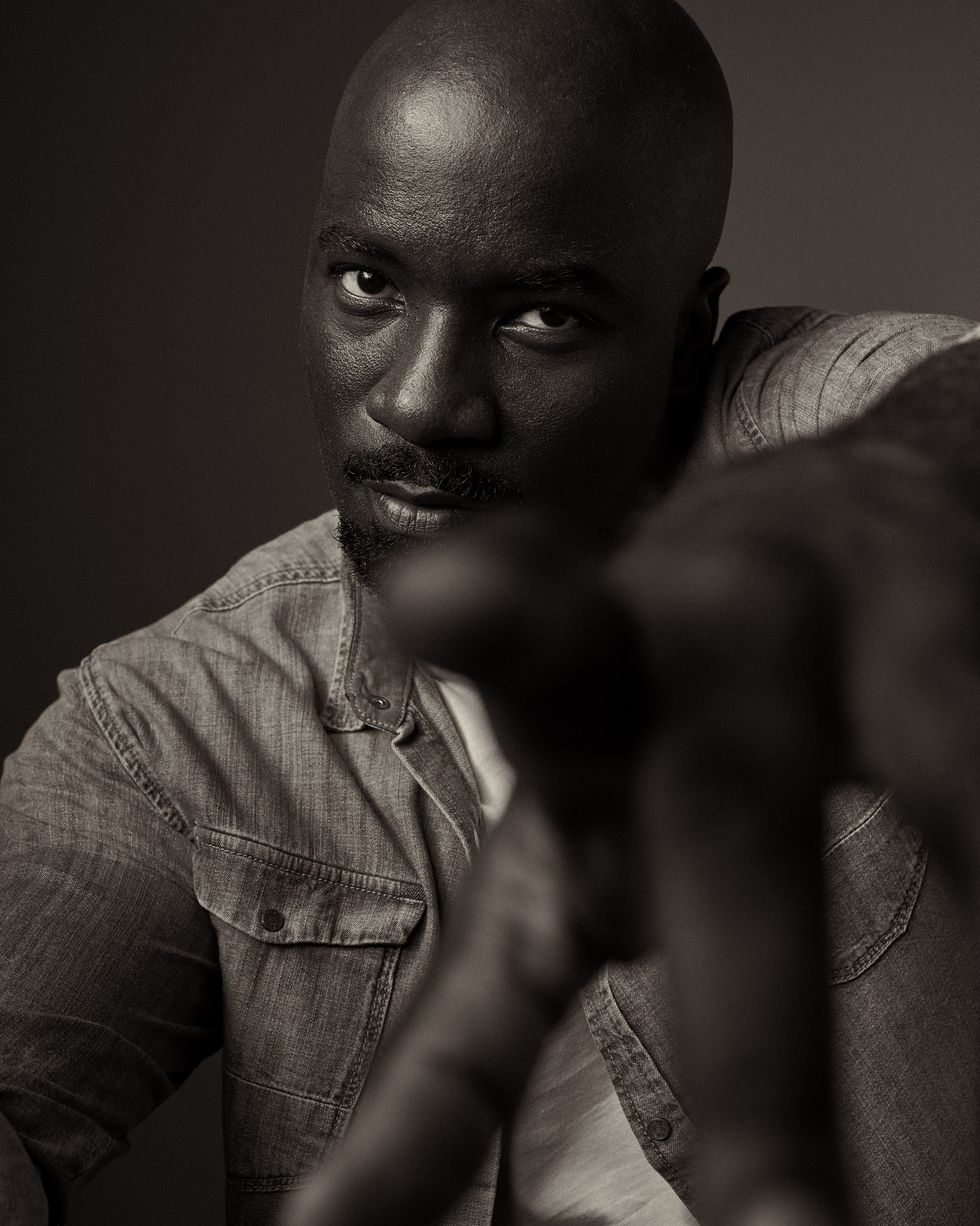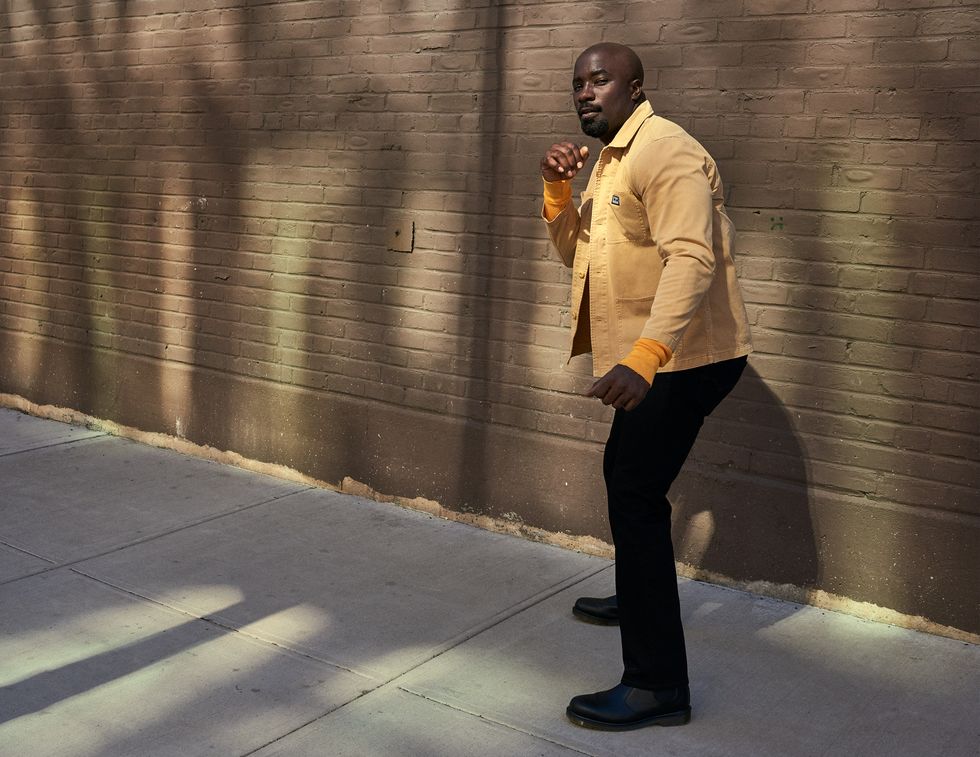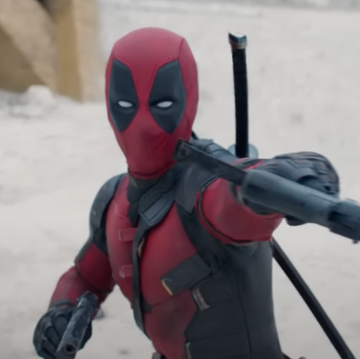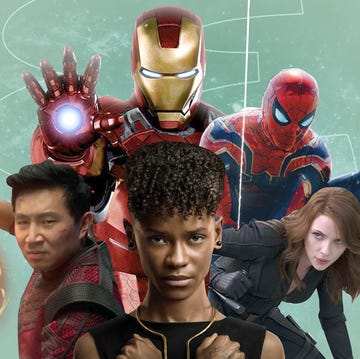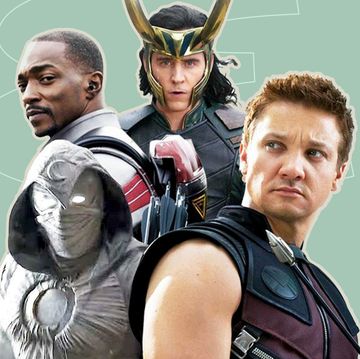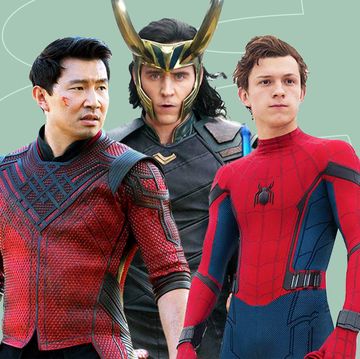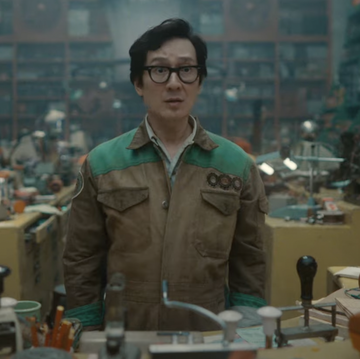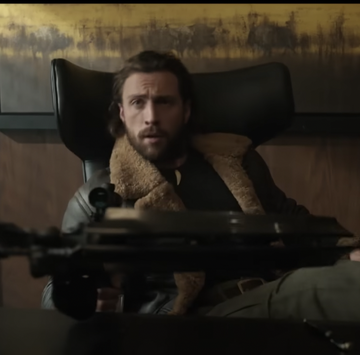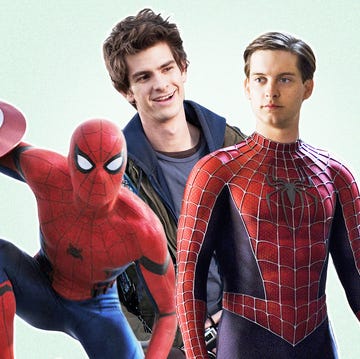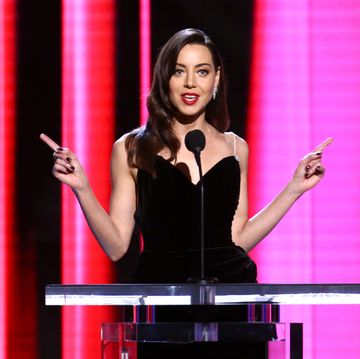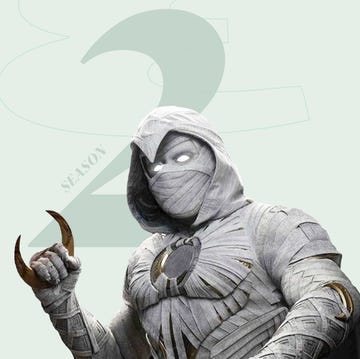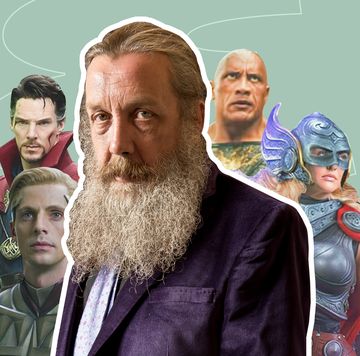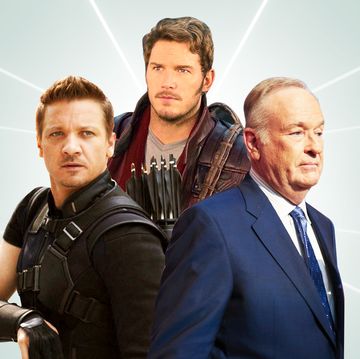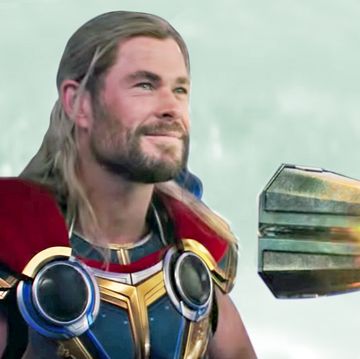Mike Colter is standing outside of a bar in north Brooklyn attempting to give a woman directions. She’s trying to find her friend at a place called the Barge Bar, which is just around the corner on the East River and only accessible from a nondescript alleyway that she’d just walked by.
He points her to the correct alleyway a few yards down the street, but she insists she already tried it.
“Why don’t you give your friend this address and have her meet you here,” suggests Colter, who, like the title character he plays on Luke Cage, is helping a local citizen—albeit in a much more mundane way than breaking up drug operations with his superhuman strength.
Colter knows this area. Although it’s nearly an hour-long train ride from Harlem, where Luke Cage cleans up the streets in Marvel’s Netflix series, he’d filmed some scenes in the studio a few doors down. One of these included him ripping a door off its hinges to use as a shield in a fight with Bushmaster, one of the villains of Luke Cage’s second season.
In the time we spend wandering around this area of Greenpoint, he’s kindly stopped for a selfie and ignored the whispers behind him saying, “That’s Luke Cage.”
With the success of Luke Cage and his own rise to stardom, Colter has to make more of an effort to walk the streets of New York incognito lately. He says he usually wears a hat to cover his “bald head” and sunglasses, and he grows out his beard. But that can’t exactly cover up a man built like an actual superhero. He’s well over six feet tall, wears a size-13 wide shoe, and has fists bigger than your head.
Now with Luke Cage's second season currently available to stream on Netflix, Colter finds himself getting approached on the street more often as his character has become an integral part of the Marvel Universe. The show is using the comic book genre as a way to explore nuanced real world issues from institutional racism to the broken criminal justice system. Along with the astounding success of Black Panther, Luke Cage is ushering in a new era of superheroes—one in which these characters tell stories that were desperately missing in Hollywood.
In the new season, Luke Cage also finds himself also dealing with fame. Having cleared his name and fought off the Hand with the rest of the New York-based Marvel heroes in The Defenders, Cage is back in Harlem, where he’s trying to fight crime while getting recognized everywhere he goes. That’s part of the problem for a superhero who doesn’t wear a mask. It doesn’t help that Cage is getting tagged on social media, with his fans tracking his every move.
But his struggles with fame are secondary to what is happening between 110th and 155th Streets. The crooked politician/gang heiress Mariah Dillard (Alfre Woodard) has risen to power in the community alongside her accomplice, Shades (Theo Rossi). Her reign is quickly challenged by a new Brooklyn villain named Bushmaster, a Jamaican street fighter with a vendetta against Mariah. Cage finds himself in the middle of a turf war with ever-shifting crime kings and queens.
Luke Cage might be bulletproof, but beneath that indestructible skin, Colter brings a vulnerable humanity to the character—one who, along with villains, must fight against corrupt politicians, a broken justice system, and institutionalized racism.
“If you could have told me that I was going to find an actor that is going to be the size of a NFL linebacker but have the sensitivity of a man a quarter of his size,” Luke Cage creator Cheo Hodari Coker says, “I would have said this person would probably be impossible to book—if he even existed.”
In a small wine bar near the studio (and where the woman eventually found her friend), Colter and I sit down to talk about Luke Cage and its value in a confused time in America. It’s Juneteenth, the holiday that commemorates the emancipation of enslaved African-Americans in 1865, and it’s a fitting day to talk about a black superhero who literally breaks free of his chains to fight crime. I ask Colter who some of his heroes were growing up, and he lists a few names, including Sidney Poitier, Denzel Washington, and his dad.
“My dad was born in 1939 on what was a plantation, sort of like a sharecropping situation,” Colter tells me. “And then, when he married my mom, they moved away from that. This was in South Carolina, so this is a weird thing because, for him, he just felt like all the stuff he achieved was more than he expected to achieve.”
One thing Colter’s dad always told him was: “Make sure you marry a woman who’s smarter than you are.” As Colter says, his dad worshipped his mother. “He thought she was the world. He always gave her that compliment,” he says.
A few days after we meet, news breaks that Colter and his wife Iva are expecting their second daughter. The two met when she was in grad school, and Colter once said on The Breakfast Club that “she's held me up many times, and I've held her up before.” In fact, production on Luke Cage's first season coincided with his wife's first pregnancy. That's two big life changes for one man—his first child, and his first leading role. Coker remembers, however, the actor being much more focused on one over the other. “Mike was freaking out,” Coker says. “'I'm about to have a kid, and I'm not going to be around.’”
That respect for women is baked into Luke Cage’s second season, and specifically into Colter’s character. Season Two devotes a good portion of its time to female characters both good and bad. Simone Missick’s Misty Knight comes to terms with being a one-armed cop after being injured during the events of The Defenders; she teams up with Iron Fist’s Colleen Wing (Jessica Henwick) for bar fights. Rosario Dawson’s Claire helps Cage navigate how to protect a woman being abused by her husband. And Mariah—a survivor of sexual assault—makes her transition from crooked community leader to ruthless crime lord.
Cage must find his own place as a male ally to these strong women in his life.
“Being a man is being sure of yourself, and understanding how to treat women, and trying to understand how you can support—but yet still be present—without taking away all of their abilities to do things for themselves,” Colter says. “Do help, but don't help too much. Be there to support, but don't try to take over everything.”
Unlike his father, Colter graduated from high school then eventually went on to college at Rutgers. After a few small roles in the early 2000s, Colter got his break as the businessman and drug lord Lemond Bishop for five seasons on The Good Wife. In 2015, he made his debut as Luke Cage in Netflix’s Jessica Jones, and a year later starred as the lead of his own show.
Originally, Luke Cage was scheduled to be the fourth Marvel series on Netflix following Daredevil, Jessica Jones, and Iron Fist. But based on the strength of Coker’s series overview, and Colter’s performance on Jessica Jones, the series was fast-tracked into production to debut ahead of Iron Fist. “They loved what Mike was doing so much on Jessica Jones that they said, ‘We got the right guy, we have the right concept, so why don't we just do Luke Cage in that position?’” Coker says.
Luke Cage arrived at a time when black superheroes starring in their own movies and shows were few and far between. It was the ideal time to revive the character credited as the first black star of a mainstream superhero comic. Inspired by the Blaxploitation films of the ’70s, Cage had largely fallen by the wayside by the early 2000s. When Colter arrived as Luke Cage, he’d dropped the character’s chain belt and silly yellow outfit in favor of a contemporary, real world look. The New Yorker called it “the first woke black-superhero show.” Coker himself envisioned it as more like The Wire at a time when “the world is in need of a bulletproof black man.”
“Even though the world of Baltimore politics and crime was the life's blood of David Simon's vision [on The Wire], he also managed to comment on what was happening in the world,” says Coker. “Young black men are being shot at epidemic rates—if they're not being incarcerated at equally epidemic rates. Our life expectancy is still low, period. Not even just from guns, but the actual stress that one faces being black in this country”
The first season of Luke Cage debuted at the height of the Black Lives Matter movement, when African-American men in hoodies were being gunned down by police. It was before Trump. And it was before Black Panther.
Colter says he was speechless when he saw Black Panther at its world premiere earlier this year. “If everything were fair in the world, Africa would be the wealthiest place on Earth,” Colter says of the film's Afrofuturist utopia of Wakanda. “There would be no poverty, there would be no kids who didn't have clean drinking water. They wouldn't be infested with diseases because of ignorance. This would be the case. It would be the wonderful empire that Wakanda is if its people were given that opportunity.”
Working together, Black Panther and Luke Cage both tell similar stories at different levels. Luke Cage looks at a community like Harlem from the ground, while Black Panther can focus on systemic racism at a macro perspective in ways that even include international policy and outreach.
As Colter describes it, Marvel’s first show starring a black superhero was the jab before its first film starring a black protagonist. “It sets everything up; you get their attention, you stun them,” he says. “You set it up for the next punch, and that's what we felt like we were doing. Right now, we're trying to throw another combination for second season—we'll see if the jab followed by the Panther's right cross leads to the upper cut.”
Both Black Panther and Luke Cage faced major challenges to pull off. “Ryan Coogler had to make the blackest movie ever that, at the same time, was palatable to a mass audience,” Coker says. “And that's really the incredible environment that we live in right now, in terms of entertainment, in that you can tell an authentically black story, not cut it down—and it's what the mainstream wants.”
In its second season, without an origin story in the way, Luke Cage has more freedom to explore these pressing topics. In one scene with Dawson’s Claire, the characters discuss Cage’s presence in the community. “I’m a black man in a hoodie—people have always been afraid of me,” Cage tells her. “A black man only has two choices in this world. You can lean into the fear, or be the big docile house cat with a smile.”
Colter views this as the burden of having been labeled a threat. “How many people walk into a room—no matter how small they are, or how large they are—and are deemed a threat because of the color of their skin?” he says. “Symbols are powerful. Images are powerful. That is something we've had to deal with. When you're born with a stamp on you, that gives people this preconceived notion about you.”
By the end of the season (and here's where you should stop reading if you haven't watched it yet, as spoilers will follow), Cage has become frustrated with the repeated failure of the criminal justice system to prosecute the people terrorizing Harlem. Money can make anyone above the law. And when the government and the police are unable to protect the community, there’s nothing left but to take justice into your own hands. Mariah has been killed by her daughter, and in her will she leaves Harlem’s Paradise—the popular club that has been the hub of gang activity—to Cage. Knowing that another crime lord will quickly take her place, Cage decides he needs to take the throne in order to stop someone worse from overrunning Harlem.
It’s while considering taking over the crime syndicate that Luke Cage drops a Trump reference at a powerful moment. He claims that he’s going to Make Harlem Great Again. His young friend D.W. compares him to Trump. “If you’re going to be the boss of crime,” he tells Cage, “you’re a crime boss.”
It’s a line that Colter interprets as a warning of things to come.
“It's calling attention to leadership—misguided leadership, leadership that's no longer humble, that doesn't listen to the people,” Colter says. “We put in a person who doesn't care about what people think. It’s become a scary notion that there's someone in charge who doesn't care what you think anymore, who doesn't care about offending his constituents, offending the people that he's supposed to serve.”
As Coker explains the Season Two twist: “What we are saying is that when you have somebody that shakes up the race—and at the same time is a strong man, but doesn't have the experience and the nuance for the world that he's trying to create—he could potentially make the same obtuse mistakes.”
The stakes are even higher for Luke Cage in Trump’s America. “I think every person who's not a white male in this country feels a little vulnerable right now,” Colter says.
That’s what makes entertainment like Luke Cage—and Black Panther—such a light in the darkness. “You know, usually entertainment is indicative of the times in which they’re made,” Colter says, “so somehow I would like to think because these things are being produced and done right now, that somehow the world is still moving forward despite signs to the contrary.” Even more vital is the fact that Luke Cage doesn’t leave its audience with a happy, simple ending. It’s as complex and contradictory as the world we live in—the world the show ultimately attempts to reflect.
By the second season’s end, Luke Cage’s future as a hero is uncertain. Elsewhere in the Marvel Cinematic Universe, things are even darker. In Avengers: Infinity War, Thanos has wiped out half of humanity—along with many of the franchise’s biggest heroes. Though they technically exist in the same greater universe, the Marvel films and the Marvel Netflix shows are created independently from one another, with little overlap in the overall narrative. So the question of whether or not the apocalyptic events of Infinity War change the world of Luke Cage can’t really be answered.
Colter has admittedly not seen the latest Avengers film yet, but assures me that his character survived the apocalypse unless he died off screen. With some actors’ contracts coming to an end with a final chapter in Avengers 4, Colter said he’d be open to seeing Cage join the film team.
“They've got their thing they're doing, and we're happy to do what we're doing,” Colter says. “We're dealing with people on a personal level, in the community. Most of the scenes in those films are between superheroes, people with supernatural abilities. It's very us-and-them— everyone else, the normal people who walk among the heroes.”
For the time being, at least, Luke Cage—and Mike Colter—remains grounded in reality, on the streets walking among us regular people. He’s helping the world on a personal level, whether its stopping a bodega from getting robbed or giving directions to a woman trying to find a bar. And in a world increasingly overwhelmed with ominous national news, it’s encouraging to know there’s still a hero next door—one like Colter, who’s out there telling human stories.
